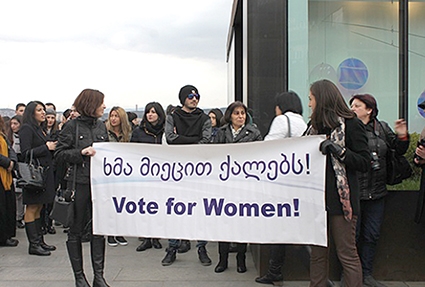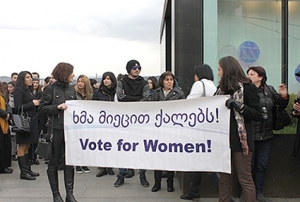Women are the Political Future
For many foreign tourists and observers, one thing is striking when strolling through the country, namely the role of women. The Orthodox Church, led by the Patriarch, and the wider Georgian public, continue to embrace the typical gender divide which has been in place for centuries. Georgia and Georgians, as every other nation and its people, can decide for themselves how they want to conduct their private life. This is the beauty of democracy, but sometimes also its failure, especially when it comes to minorities hoping to break through these specific gender roles.
Politics in Georgia is one field where male dominance is most visible. Despite recent improvements and more women holding public offices, active political engagement is considered to be a goal pursued more by men than by women. One might wonder what the public thinks, and indeed, 52% stated last year that Parliament does not have enough women representing the general population. Currently, around 23 of the 150 members of parliament are women, with numbers for city councils and municipalities often even lower than that.
Yet, the numbers are not that clear and point rather to a confronting divide between two sides. Around 39% indicated that enough women are in parliament and 4% even expressed unhappiness about the 23 female MPs. When turning the tables and analyzing the situation from the other side, the country seems perfectly split, with 47% saying that too many men are in parliament and around 44% saying that there are enough men and nothing should be changed. 3% even have the opinion of too few men representing the public. So, overall, the situation isn’t really something one can write home about.
Is there truly such a divergence between these two sides? What brings Georgia to such a confrontational course? Increased female participation is considered to be part of a wave of liberalism hitting the shores of Georgia. These liberal values are critically observed and viewed by the clergy and other nationalist groups, often being aligned with a pro-Russian ideology. Many see the West as trying to indoctrinate Georgia due to its need to build up close relations with NATO and the European Union to defend its sovereignty.
This deep-rooted confrontation surfaces when specific legislation regarding gender equality emerges. Western observers shouldn’t be mistaken and see Georgian men as vicious individuals, who deny the rights of women. Their understanding and value of these rights just profoundly differ from the Western understanding. Discussions about these topics often turn into a debate of humanity vs. barbarism: Western women’s rights being equaled with progress and prosperity away from a primitive state. Yet, minds debating these issues may benefit from understanding the many advantages of Western women’s rights and the imperative urge for emancipation.
The ablest fighters who battle on this ground are the many powerful women who already have a say when it comes to policy-making and spurring cultural transformation. The work undertaken by women across the political spectrum is proportionally more effective than the work by men, as data has shown. They basically do their homework better, resulting in a more efficient decision-making process.
The field of female emancipation encounters wide ranging obstacles and myths put out by patriarchal hierarchies fearing the rise of strong, independent individuals. A UNDP study conducted by Giorgi Urchukhishvili assessed essential myths circulating among the Georgian public on why women shouldn’t access the political field. One of the most used arguments is that women are simply less competent than men; however, it clearly shows that women encounter many more obstacles to enter the political process, often fighting through male-dominated party leadership. Thus, successful women obtaining a seat in parliament usually end up being extremely competent, outsmarting many male counterparts in policy draft sessions.
Another major stereotype is the idea that women are innately “conflicted” and are unable to make unbiased and independent decisions. This argument, however, has no basis and is highly used by male commentators to isolate women from the decision-making process. This in turn ensures male power and that their privileges are maintained in the political process. The argument of “conflictuality” goes hand-in-hand with the idea that women don’t possess the capacity to achieve political success without the help of men. Again, this argument is absolutely unfounded. This demonization purely aims at portraying women as untrustworthy individuals unable to make their own decisions. The study even considers this argument to be a barrier for women. “In reality, this myth creates barriers for women's political participation, inasmuch as women's competences and their sense of responsibility are overlooked, and in the meantime the fact that a woman was 'brought' by men into a party is emphasized, therefore competent and educated women find themselves in the position of justifying themselves/proving that they are competent,” notes Urchukhishvili.
The report goes on to bust numerous other myths, such as "Provincial women in parties are uncultured/uncivilized" or "Men in parties have principles and are brave". When analyzed, the debate whether women should undergo emancipation compared to sticking to traditional ideologies is, in fact, hijacked by powerful, male individuals to protect their personal status. The justification of following a mere Russian-based political ideology is as much invalid as the accusation of Western indoctrination harming the long-existing Georgian culture.
A country nestled in the Caucasus mountains has the (wo)menpower to finally refute myths and stereotypes side-lining female voices to the margins of society. Men engaging in women’s rights debates and advocating higher female participation don’t shoot themselves in the foot but build an escalator for both genders to move up the ladder of a more prosperous and fairer society, together.
By Benjamin Music












